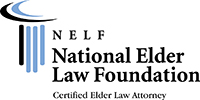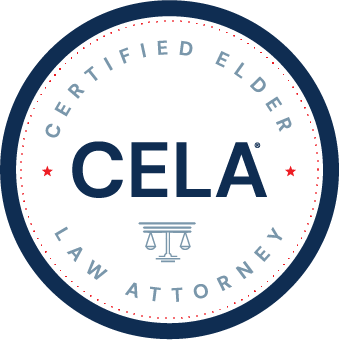For some time attorneys have called themselves elder law attorneys. Until recently, there was no way for a consumer to determine the experience and qualifications of attorneys practicing elder law. The term meant different things to different attorneys and some attorneys used the phrase "elder law" just as a means to market their practice.
Elder law attorneys may now be certified in this field by the Board of Certification of the National Elder Law Foundation (NELF), a non-profit organization founded in 1993, and dedicated to the development and improvement of the professional competence of lawyers in the area of elder law. The purpose of the certification program is to identify those lawyers who have the enhanced knowledge, skills, experience and proficiency to be properly identified to the public as certified elder law attorneys.
What Must A Certified Elder Law Attorney Know (CELA)?
The Board's expectations of an elder law attorney's knowledge are expansive. To become a certified, the attorney must know the following subjects:
- Health and long-term care planning;
- Public benefits (includes Medicaid, Medicare, Social Security);
- Surrogate decision-making (includes powers of attorney and guardianship);
- Legal capacity issues;
- Income, estate and gift tax issues;
- Wills, trusts, probate and trust administration planning; and
- Financial planning questions for retirement and investments.
In addition, the Board expects attorneys certified in elder law to be capable of recognizing issues of concern that arise during counseling and representation with respect to:
- Abuse, neglect, or exploitation matters;
- Insurance;
- Housing;
- Long-term care;
- Employment; and
- Retirement
Finally, the attorney must be familiar with professional and non-legal resources and services publicly and privately available to meet the needs of the older person, and must be capable of recognizing the professional conduct and ethical issues that arise during representation.
Who Can Be Certified?
Certification is open to licensed attorneys who have been in practice five years or more. During the three years prior to application they must have spent at least 16 hours per week practicing elder law, must have handled at least 60 elder law matters in specified elder law subjects, and must have had at least 45 hours of continuing legal education in elder law. A certified attorney must be re-certified every five years, and has to meet similar requirements.
Why Select a Certified Elder Law Attorney?
Certainly, there are lawyers who are not certified that are competent to handle most elder law matters. However, lawyers who are certified as specialists have been recognized by independent professional certifying organizations as having an enhanced level of skill, as well as substantial involvement in established legal specialty areas. Certifying organizations require lawyers to demonstrate special training, experience and knowledge to ensure that recognition as a certified specialist is meaningful and reliable. Don't guess, use a certified specialist.
Learn more
Learn more by browsing our Firm Information.
Call (720) 200-4025 now or email us to find out how our attorneys can help with your Special Needs Trusts issues.












